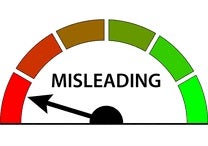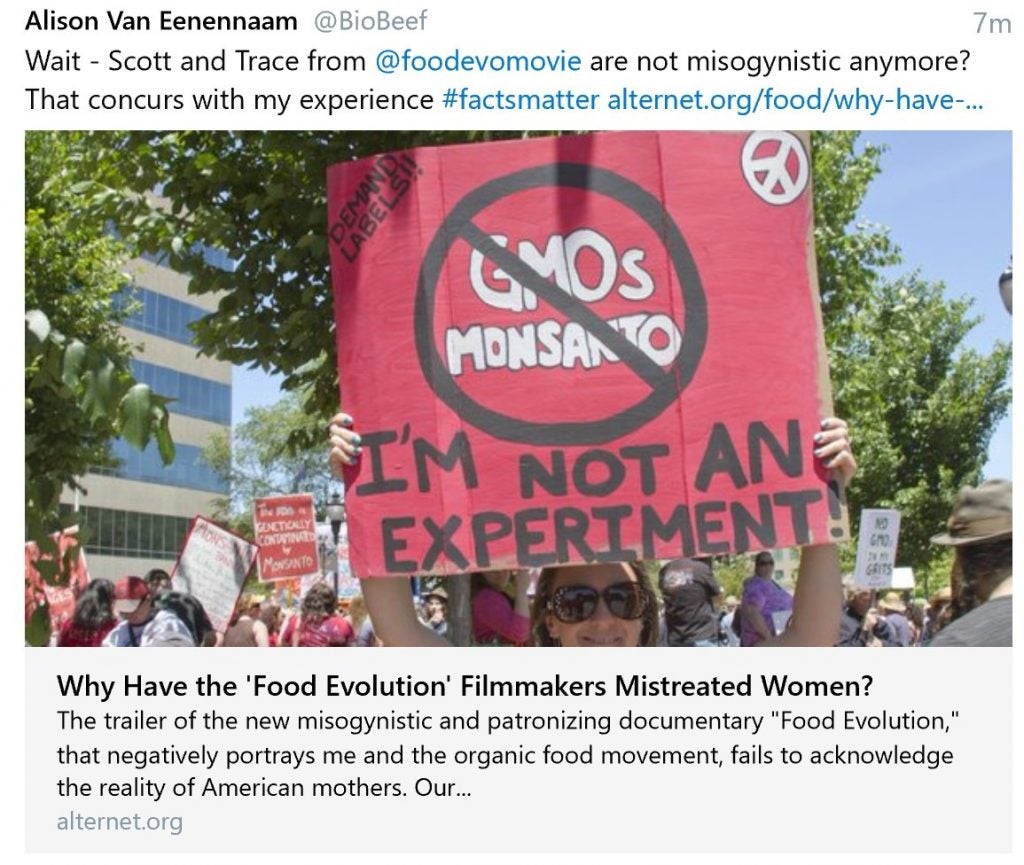
The standard for voluntary food labeling in the US is that it must be “truthful and not misleading”. I wish that was true for all speech. In this era of alternative facts and disdain for expertise, there are many politicized topics where objective facts and inconvenient truths are ignored if they don’t match up with preexisting beliefs.
Although many on the left like to point fingers at the right as science denialists when it comes to climate change, there are also some topics such as vaccines and GMOs that are sacred cows, facts be damned for some left of center folks.
I am a faculty member at UC Davis, and I happen to work in animal agriculture. Our sector, in particular, has been the target of many misinformation campaigns. Think of the “pink slime” lawsuit that was just settled between a producer of lean finely textured beef and ABC News. Meanwhile, people routinely reach for milk labelled free of antibiotics, despite the fact that all milk is free of antibiotics This flows from the oft-repeated myth that dairy cows are “pumped full” of antibiotics. They are not, despite what this misleading labeling might have you believe, and every single tanker of milk in the state is tested prior to sale to ensure it contains no antibiotic residues.
Perhaps nowhere is food fear-mongering more prevalent than in the toxic debate around genetic engineering and “GMOs”. The 51% gap in perception between the public’s feelings on the safety of GMOs and the understanding of the scientific community (37% of the public think GE products are safe versus 88% of scientists) is greater than the gap for any other topic, including anthropogenic climate change.
For 20 years, thousands of studies, eleven National Academies reports, and indeed every major scientific society in the world have attempted to interject objective evidence of GMO safety into the debate without making much progress. The fear-mongering, however, has been relentless – and often – disingenuous, as evidenced by the “non-GMO” labeled rock salt that has popped up in the grocery story (spoiler alert – salt doesn’t contain DNA so salt cannot be genetically engineered – all salt is “non-GMO” salt). But, it is much easier to sell fear than science.
As frustrating as it is to logic-driven scientists, people often don’t make decisions on facts alone. Rather they base them on a mixture of gut instinct, world view, and trust. And in this age of widespread suspicion and distrust, it seems many marketers stand willing and ready to monetize distrust by providing “natural” food and “absence” labels for attributes that were never present in that product in the first place. “Gluten free” water comes to mind.
The GMO safety narrative is seemingly chock full of villains (corporations), victims (public health), and heroes (activists) – the necessities of a great story. And although this narrative has been accurate in the past – think tobacco or PCBs – and may be again on for some new product – , in this case the data do not square with the frightening health claims that have been associated with genetic engineering. Betting against the overwhelming weight of scientific evidence on any topic, be it GMOs, vaccines or climate change, on the basis of a single study or a conspiracy theory is a very high stakes wager.
Scientific societies are encouraging scientists stop shying away from engagement with the public, even on the most polarizing science. And they are advocating for effective science communication. That is easier said than done, but I am engaging – as I am passionate about science, the scientific method, and the need for science-based policy as a key basis for an informed democracy. That is the future I want to leave to my children.
To address this call for increased public engagement, I recently agreed to participate in a feature documentary movie, Food Evolution. Narrated by the esteemed science-communicator Neil deGrasse Tyson, this film uses the GMO debate as an illustrative proxy for broader questions around how we make decisions, and which sources of information we put our trust in.
It has been an interesting experience to interact with audiences at the various screening venues I’ve attended, ranging from New York to Cleveland to Berkeley. Some in the audience have been open to considering new information about how GMO breeding methods might be used in certain situations to produce disease-resistant crops. Some have changed their mind. Others have resorted to motivated reasoning in order to summarily disregard facts that did not agree with their world view. Post-screening questions from those individuals tended to be monologues cataloging points of disagreement, rather than a conversation about possible areas of agreement or solutions to problems.
And then there has been a loud outcry from some members of academia following a June 16 evening screening of Food Evolution at UC Berkeley that I helped organize. A letter signed by 45 individuals entitled “Response to UC Berkeley Early Screening of “Food Evolution”” was posted on the foodfirst.org website on June 16. I happened to see a draft of that letter from a UC Berkeley listserve dated June 15, one day before the screening, that read
“This particular film — Food Evolution — deserves to be called out for what it is: a piece of propaganda. Full disclosure: most of us have yet to see the film in full, but many of us have seen clips, and a few of us were interviewed during film production.”
That clause was removed from the version posted on the web the next day, but the rest of the wording remain unchanged. In other words, most of the people that willingly signed onto the letter criticizing the movie had not even seen it. That is the actual definition of confirmation bias. As academics, shouldn’t you see/analyze something before you offer a detailed critique? I have not yet seen your movie but I offer the following criticisms…..
This group wrote that the movie “manufactures scientific consensus where no such agreement exists”, and cites one paper entitled, “No scientific consensus on GMO safety” that was also a document signed by like-minded individuals including several of the 45 signatories of the Food Evolution critique. This “No Consensus” paper was coordinated by the European Network of Scientists for Social and Environmental Responsibility (ENSSER). It should be noted that this group, formed in summer 2008 to challenge the consensus on GMO safety, holds a position on GMO safety that runs counter to that of every other major scientific society in the entire world including the National Academies of Sciences, Engineering, and Medicine which was formed by Abraham Lincoln in 1863. Food Evolution argues for evaluation of the entirety of the scientific literature, and to avoid cherry picking single studies just because they agree with your perspective. The movie did not manufacture scientific consensus on GMO safety, it reported the conclusions of the world’s scientific societies, sans one outlier.
As expected, activists have also gone after the movie. Zen Honeycutt, from Moms Across America, first went for a full sexism attack, with an article originally headlined, “Why Have the ‘Food Evolution’ Filmmakers Mistreated Women?” The salvo opened by calling the film “misogynistic and patronizing.” A misogynist is a person who dislikes, despises, or is strongly prejudiced against women. Her evidence of that was pretty slim, especially given the prominent role played by a number of female scientists, farmers, and journalists in the movie. She has since toned it down to now just ask the question, “Have the Food Evolution filmmakers mistreated Moms?” (although the URL still is called “why-have-food-evolution-filmmakers-mistreated-women?”). So I guess the accusation now is that the film makers only mistreated those women who have given birth, not the entire female population.

The original posting has a heading that stated Food Evolution had mistreated women
As a mother, and a woman, and someone who has dealt with my fair share of sexism in my career, I take the charge of misogyny pretty seriously. I feel I have a pretty good sense of spotting misogynists, as I have seen the damaging impact of their behavior in numerous professional situations. Calling someone a misogynist is a damning allegation. And when it is thrown around baselessly with the malicious intent of slandering the filmmakers of Food Evolution, director Scott Hamilton Kennedy and producer Trace Sheehan, two men whom I respect and admire and who are absolutely NOT misogynists, I call out of bounds. If anything, the scaremongering around GMOs mistreats moms and their families by creating fear and mistrust of the conventional food supply in the absence of any scientific evidence. This can scare mothers on tight budgets to pay money they can’t afford for expensively labeled foods and to avoid fresh produce due to a misplaced fear of pesticides. Praying on a mother’s fears for the safety of her children is the most disingenuous use of marketing that I can imagine. May there be a special place in hell reserved for people who profit from exploiting moms’ protective instincts.
Food Evolution weaves science into a narrative story. It advances the discourse around GMOs from a stale false dichotomy to a more nuanced discussion about how replicable science might be used to develop “Yes/And” solutions to problems. It does not address every issue associated with food production. No movie could. But it clearly puts a stake in the ground around the safety of GMOs, to try to dispel the pervasive myths that are blocking the deployment of this breeding method to address real problems. Some are trying to label Food Evolution as propaganda. That label is again false and misleading.
At the end of the day, Food Evolution is really a movie about how people make decisions in the face of uncertainty. It’s also about the importance, and difficulty, of changing your mind based on new evidence and objective truths. At this juncture in history, it is an opportune time to consider one of the key questions posed in the movie – when considering a matter of substance: When was the last time you changed your mind, or perhaps as importantly when is the last time you opened your mind?